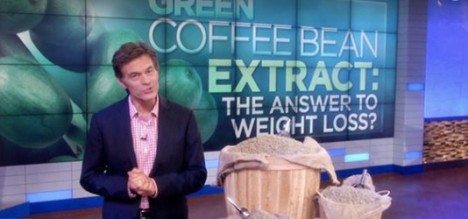Dr. Mehmet Oz: Counterculture Healer or Fame-Driven Quack?
Dr. Mehmet Oz, christened “America’s doctor” by no less an icon than Oprah Winfrey, has been in the public eye a lot lately. Of course, Dr. Oz has been in the public eye a lot for quite some time, thanks to a one-man media juggernaut that includes: the five-time Emmy winning Dr. Oz Show, with an audience of nearly 3 million in the U.S. and over 4 million worldwide; a magazine called The Good Life; regular syndicated radio segments, and columns in big-circulation newspapers; a website visited by millions, and legions of admirers on Facebook, Twitter and other social media sites. He is of course a best-selling author of dozens of books promoting healthy living, or at least his version of it


Dr. Mehmet Oz, christened “America’s doctor” by no less an icon than Oprah Winfrey, has been in the public eye a lot lately. Of course, Dr. Oz has been in the public eye a lot for quite some time, thanks to a one-man media juggernaut that includes: the five-time Emmy winning Dr. Oz Show, with an audience of nearly 3 million in the U.S. and over 4 million worldwide; a magazine called The Good Life; regular syndicated radio segments, and columns in big-circulation newspapers; a website visited by millions, and legions of admirers on Facebook, Twitter and other social media sites. He is of course a best-selling author of dozens of books promoting healthy living, or at least his version of it.
He has been called the most influential health professional in America, and with good reason: he probably is. The problem with that, according to a large number of critics in the medical community, is that Oz is a “snake-oil salesman” and “quack” who incessantly uses his media pulpit to promote what are either alternative medicine or bogus and discredited miracle supplements and treatments, depending on your point of view.
There is no doubt that Oz is a brilliant physician. After getting his M.D. at the University of Pennsylvania, he went on to win the prestigious Blakemore Research Award at Columbia for four straight years as its most outstanding surgery resident, invent numerous procedures and devices now used in the practice of heart surgery, and become the vice-chairman of Columbia’s surgery department.
There is also little doubt that he is a medical entrepreneur and marketing wizard: along with the M.D., he got an MBA at Penn’s Wharton School of business, and filed for and received eleven patents for the aforementioned procedures and devices. And he turned an appearance on the Oprah Winfrey Show in 2004 into the media behemoth described above. As for Oprah’s “America’s Doctor” designation – he trademarked it, registration number 77246874.
Oz has been particularly conspicuous in the news just lately because criticism directed at him from various health professionals has been heating up dramatically. In December a study appeared in the British Medical Journal which vetted 479 individual health recommendations made by Oz on television involving treatments or supplements and found that supportive research existed for less than half – 46 percent – of them, and was nonexistent for 39 percent and actually refuted another 15 percent.
An article in the Journal of Nutrition and Cancer denounced Oz’s promotion of “miracle foods” in general and his claim that regular consumption of sea bass, red onion and endive could cut one’s chances of ovarian cancer by 75 percent in particular. Most recently, a group of ten noted doctors led by Stanford’s Henry Miller sent an open letter to Dean Lee Goldman at Columbia which demanded that Oz’s vice-chairmanship be withdrawn, and accused him of having “misled and endangered” his legions of followers and of manifesting “an egregious lack of integrity by promoting quack treatments and cures in the interest of personal financial gain.” Their conclusion: “Dr. Oz is guilty of either outrageous conflicts of interest or flawed judgments about what constitutes appropriate medical treatments, or both.”
Why “America’s Doctor” Could be Bad For Your Health
The list of questionable, or worse, endorsements and claims that Oz has made on TV is compellingly long. Among the items:
-
He is a fervent booster of homeopathy, a concept as scientifically devoid of value as faith healing, which he has also discussed favorably.
-
He warned viewers that his own studies indicated that children were being poisoned by arsenic in apple juice, which an FDA investigation later determined to be nonsense.
-
He pitches various herbal and other supplements as miraculous weight-reducers, such as his assurance that green coffee bean supplements “burn fat fast.” But the Federal Trade Commission subsequently settled a $3.5 million suit against the supplement's makers for fraudulent marketing. He also praised Garcinia cambogia as “the simple solution … to bust your body fat for good.” But scientific studies have found the stuff to be useless.
-
He has railed against genetically modified foods citing research that has been discredited.
-
He lauded certain fitness and health-tracking products made by Sony, which happens to be the co-producer of his TV show.
So – is Dr. Mehmet Oz a genuine quack, a shill for false nostrums and miracle cures who is peddling junk health products to a gullible and trusting public? Did one New England M.D. who writes under the pseudonym Russell Saunders nail it by declaring that, “Dr. Oz’s credentials are truly impressive but somewhere along the way he decided that his fame was more important than his credibility”?
Only Oz knows what his true motives are. But one can make a good case that Oz himself is one of the gullible ones here. Long-term friends and medical colleagues recall that he has always been a dedicated advocate of alternative medicines, and that he was studying and extolling the likes of hypnosis, Eastern medicine, guided imagery, acupuncture, homeopathy and other health-industry outliers years before he even, appeared on television. Healing from the Heart, a book he wrote in 1998, recounted his experiments with reflexology, aromatherapy, therapeutic touch, yoga, prayer and reiki, or “energy medicine” as healing tools.
But while this may relieve Oz of culpability – assuming that he’s as much a dupe as those who believe him – it does not relieve him of the responsibility that goes along with a huge public following, professional credibility, and being one of Time magazine’s “World’s 100 Most Influential People.” The ugly reality is that his TV show has conspicuously become a magnet for charlatans peddling health scams in pursuit of the “Oz Effect,” which refers to the almost invariable spike in product sales for anything even mentioned approvingly thereon, whether legitimate or otherwise.
His supporters, and there are plenty, insist that he also provides a great deal of medical knowledge and helpful information to millions who would probably not be exposed to it otherwise. But, as one New York M.D., Eric Rose, noted, “Mehmet is now an entertainer. Sometimes (he) will entertain wacky ideas, particularly if they are wacky and have entertainment value.” Presumably, people who don’t understand that the show is basically entertainment and not science have only themselves to blame for embracing silliness. But if Oz endorses dubious “miracle” programs or products because that’s what attracts viewers , he is practicing hucksterism, not medicine.
In responding to the doctors’ letter demanding that Columbia demote him, Oz devoted a special episode of his TV show to a reply to their charges. His defense: the First Amendment. “Freedom of speech is the most fundamental right we have as Americans. And these ten doctors are trying to silence that right. So I vow to you right here and right now: we will not be silenced.” In reality, however, the issue here is the welfare of Oz’s followers, and by shifting the discussion to freedom of speech, he is simply ducking that issue. And, to employ a truly grievous pun, “If it ducks like a quack …”
The point is that freedom is dangerous in the absence of restraint and responsibility. One writer found “many doctors from across America” who complained about having to dissuade patients of theirs from pursuing worthless regimens or treatments touted by Oz, or following advice that was in fact hazardous given their medical conditions. If he is knowingly endorsing bad medicine simply because it builds ratings, he may be to some extent the “menace” that some critics claim. Is he doing so? Well, consider that after several days of advance fanfare, he delivered his defense of his actions on his show on April 23. Which happened to be day one of the May “sweeps season” when ratings are established for advertising purposes.
Ultimately, the primary loyalty of “America’s doctor” should be to the scientific method, not to his philosophical devotion to alternative medicine, and his highest priority should be his audience’s best interests, not its size. He may not be a conscious fraud, but he could very legitimately be called a health hazard.

By Robert S. Wieder, CalorieLab’s Senior Health Columnist since 2006. Author of several books, including 115 Reasons Why It’s Not Your Fault You’re Fat, Bob wrote for numerous national magazines after starting out as editor of the UC Berkeley humor magazine the California Pelican. He also put in a stint as a San Francisco-area stand-up comic.
Dr. Mehmet Oz: Counterculture Healer or Fame-Driven Quack? is a post from:
SOURCE: – Read entire story here.







